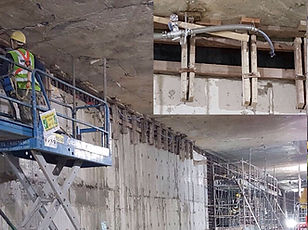Home / Solutions
Comprehensive Construction Equipment Rental Solutions
Our construction equipment rental services provide reliable tools to enhance your projects. From floor leveling to road repair, our range includes everything you need for efficient and effective construction. With a focus on quality and performance, our machinery ensures you complete tasks on time and within budget. Choose Teesin for trusted construction equipment rental solutions.

Concrete Spraying
Sprayed concrete is the method by which concrete is sprayed into place, rather than the more conventionally used pouring or placing into the formwork. Wet process sprayed concrete: uses batched wet concrete pumped through a hose or pipe to a discharge nozzle where high-pressure air propels the concrete into position.

Concrete Grouting
Grouting in civil engineering refers to the injection of pumpable materials into a soil or rock formation to change its physical characteristics. It is one of the ways groundwater can be controlled during civil engineering works. The purpose of grouting can be either to strengthen a formation or to reduce water flow through it. It is also used to correct faults in concrete and masonry structures.

Concrete Cutting
Concrete cutting is a process of controlled sawing, drilling and removing concrete. Skilled operators use special saws to cut concrete and asphalt with precision, accuracy and very few mistakes. A high-standard commercial concrete cutting company should be using these modern concrete coring strategies and tools.

Material Handling
A load cell is a transducer which converts force into measurable electrical output. Although there are many varieties of force sensors, strain gauge load cells are the most commonly used type.

Floor Cleaning
Pressure washing or power washing is the use of high-pressure water spray to remove loose paint, mould, grime, dust, mud, chewing gum and dirt from surfaces and objects such as buildings, vehicles and concrete surfaces. Machines that produce pressures from 750 to 30,000 psi (5 to 200 MPa) or more are available.
A Guide to Buying the Best Construction Machinery for Your Needs
When it comes to construction projects, the right pieces of machinery can make a big impact. Whether you're building a home or an office complex, understanding which types of construction machinery are best for your job can help ensure that your project goes smoothly and on schedule.
Understand the Types of Construction Machinery.
Knowing the types of construction machinery available can help you decide what is best for your project. Heavy construction machineries such as cranes and bulldozers are used for large projects like engineering projects and the construction of buildings, while light construction machinery such as hand tools are used for smaller tasks such as repairing sidewalks or hanging drywall. A combination of both heavy and light machinery will likely be necessary for most projects.
Set a Budget Before Making Any Purchases.
Before you begin your shopping, it’s important to set a budget that works for you. Decide what types of machinery are most important for the project, and how much you can realistically spend. Make sure to factor labor costs into your budget as well; hiring skilled workers to operate the equipment is just as important as buying it in the first place. Understanding your project's needs and setting a realistic budget before making any purchases will ensure that you get the best construction machinery for your money.
Consider the Reliability of the Machine You’re Buying.
It’s important to understand the kind of reliability you need from your construction machinery. Different types of construction machines have different levels of reliability, so make sure you do your research before making any purchases. Look for reviews and testimonials from customers who have used the machine in the past, and keep in mind that newer models likely have more advanced features and better warranties. If a piece of machinery is known to break down regularly or is frequently in need of repair, it may not be worth investing in.
Take Into Account Energy Efficiency & Maintenance Costs.
When choosing construction machinery, it’s important to consider more than just upfront costs. While the initial cost of a machine may seem appealing, there are ongoing maintenance and energy costs associated with it that can add up quickly. Look out for machines with low fuel consumption rates or those that don’t need frequent refueling or replacement parts. Additionally, see if the manufacturer offers any warranties or guarantees on the product - this could help to offset future repair and/or parts costs.
Look for Reputable Suppliers & Warranties.
One of the best ways to ensure you’re getting quality construction machinery is to purchase from a reputable supplier. Researching suppliers and reading customer reviews can help you find reliable and trustworthy businesses. Additionally, look for warranties or guarantees on construction machinery that might be offered by the manufacturer or seller - this can provide peace of mind knowing that any issues with machinery may be covered.













